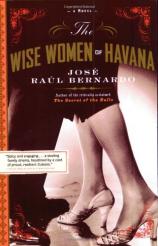The Wise Women of Havana
Review
The Wise Women of Havana
For Americans, Cuba conjures up diametrically opposed images: strict communism and oppression on the one hand and the richness and color of the tropical island on the other. The reality of life in Cuba today is probably somewhere in between the extremes we imagine. In his latest novel, THE WISE WOMEN OF HAVANA, José Raúl Bernardo captures some of that middle ground between the bright colors and entrancing music and the dullness of poverty. Set in the years between the U.S. stock market crash that devastated Cuban sugar exportation and the rise to power of the Communist Party, the novel portrays the struggles and the spirit of the Cuban people as exemplified by one diverse family.
Marguita and Lorenzo are happy newlyweds starting their life together in a wonderful house of their very own. But Cuba's economic crisis spells disaster for Lorenzo's once wealthy Spanish family and soon the young couple moves in with them to help financially. And, with a baby on the way, it seems like a good plan. Marguita has difficulties reconciling the Cuban culture she is so proud of with the Spanish traditions her new husband grew up with. But, with the support of her own parents and siblings, she feels she can overcome any barriers. However, once Lorenzo's spinster sister, Loló, offends Marguita by invading the couple's privacy, Marguita feels they must leave Lorenzo's family home and they move to the barrio Marguita grew up in. As her hatred of Loló grows, Marguita turns to her mother, Dolores, for advice and comfort. And, as Marguita and Lorenzo try to put the incident behind them and plan for their future, Loló has a magical, forbidden and brief affair that brings her and Marguita closer than each will ever fully realize. Both women, ironically, face similar struggles and each must learn to trust themselves and accept the help of the more experienced women in their lives. Each, after experiencing bliss and happiness as well as sorrow and fear, must begin a lifetime journey towards acceptance and wisdom.
While the plot is simple, the story is emotionally layered and complex. Bernardo's light tone and easy storytelling belay the seriousness of the story. The characters are often struggling with life altering, if not life and death, decisions. Motherhood and womanhood are the main themes and Bernardo is wise enough himself not to imply that they are the same thing, although in 1930's Cuba, they are often seen as such. For Bernardo, as for his characters, womanhood is about tough decisions, strong relationships, forgiveness, self-preservation and self-confidence. Still, the men in the novel are not ignored in favor of the women. They, too, are complex, if less developed characters. Marguita's father is interesting and dynamic, a perfect partner for Dolores. And the two priests, Francisco and Alonso, mirror Dolores and Marguita in many ways. The cultural tensions between Spaniards and Cubans are presented, although Bernardo doesn't spend too much time with this subject. Lorenzo's family is every bit as compelling as Marguita's but are paid less attention to by the author. Many topics and characters could have been explored more deeply; still, the novel doesn't seem lacking in any significant way.
THE WISE WOMEN OF HAVANA at once speaks of a particular time and place and transcends era and culture. As the story of a Cuban family in 1938, it is moving and nicely written. As a novel of women and their choices and relationships, it is endearing and passionate. Bernardo paints a picture of the sky, the beaches, the streets, the alleys, and the faces of Havana, yet roots his story in universals. In his novel, the women of Havana are wise in many ways --- in their realness, in their solidity and in their emotions. And wisest perhaps in knowing that wisdom itself is something you gain as you go along.
Reviewed by Sarah Rachel Egelman on January 24, 2011
The Wise Women of Havana
- Publication Date: February 1, 2003
- Paperback: 336 pages
- Publisher: Harper Paperbacks
- ISBN-10: 0060936150
- ISBN-13: 9780060936150




